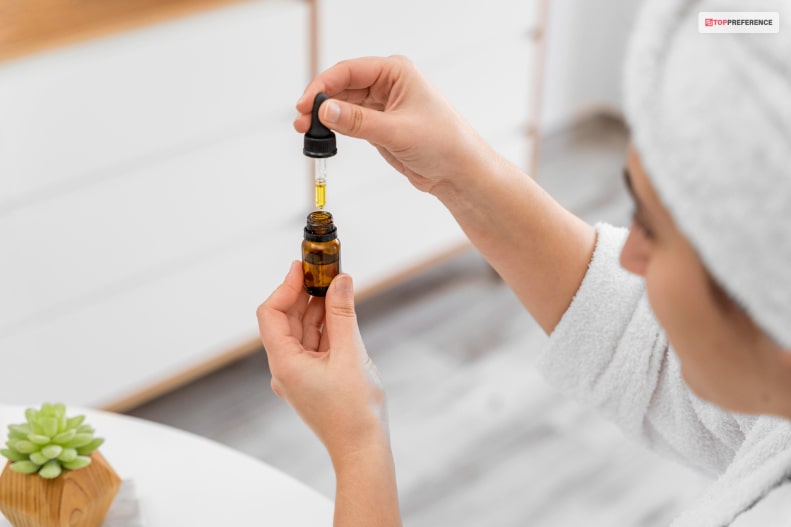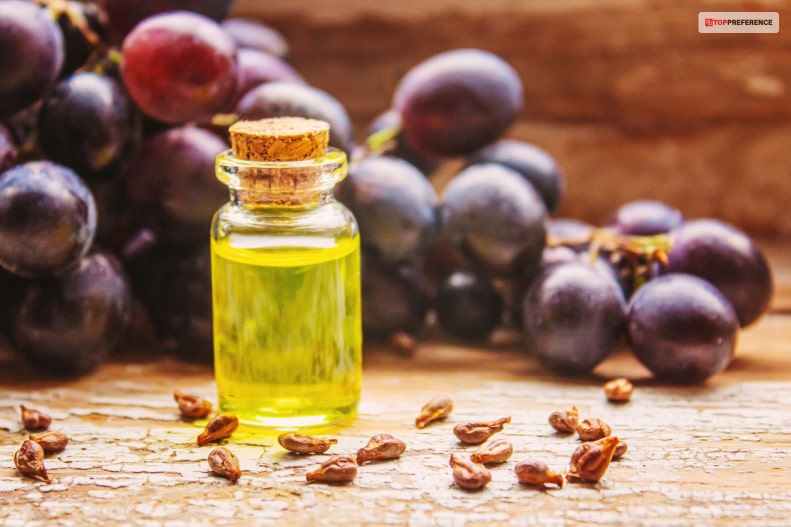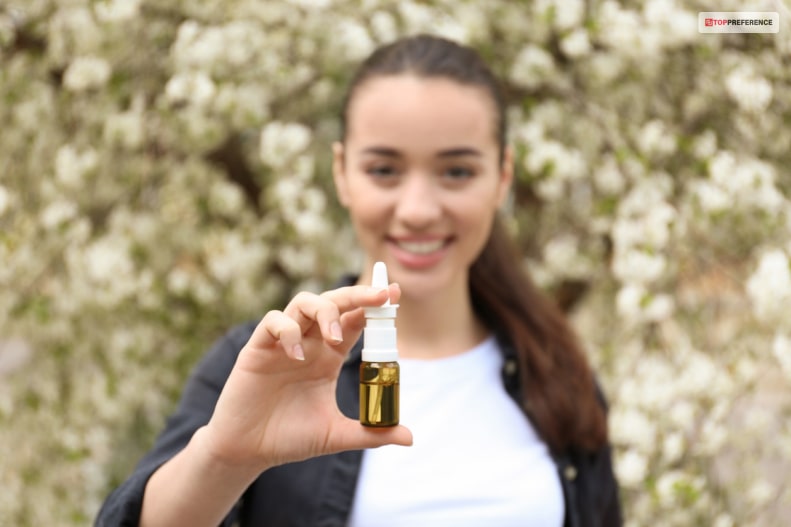Everything You Need To Know About Facial Oil | Best Facial Oils In 2023
Are you searching for information related to facial oil? If your answer is yes, then you have reached the right place!
Facial oil has gained popularity in skincare routines due to its numerous benefits for the skin. It is a versatile product that can be used by individuals with various skin types, including dry, oily, and combination skin.
In this article, I will be talking about facial oil and how you can use it to make your skin better. I will also be talking about the best facial oil that you can use for your skin. So keep reading this blog to know almost everything about facial oil?
What Is Facial Oil?��

Facial oils are concentrated blends of natural or synthetic oils that are specifically formulated for use on the face. These oils are designed to provide various benefits to the skin, including hydration, nourishment, and protection.
Facial oils are typically lightweight and easily absorbed into the skin. They are different from moisturizers, as they focus on providing a concentrated dose of nutrients and hydration to the skin. While moisturizers often contain a mix of water and oil, facial oils are pure oils or oil-based formulations.
Facial oils can be made from a variety of plant-based or synthetic oils. Common plant-based oils used in facial oils include jojoba oil, rosehip seed oil, argan oil, marula oil, and squalane oil. Synthetic oils can also be used, which are often derived from petroleum or other sources.
These oils contain a range of beneficial components such as essential fatty acids, antioxidants, vitamins, and minerals. They can help nourish the skin, improve its texture and appearance, protect against environmental damage, and address specific skin concerns such as dryness, aging, or inflammation.
How To Use Facial Oils?��

Facial oils can be used as standalone skincare products or incorporated into a skincare routine along with other products such as cleansers, toners, serums, and moisturizers. They are typically applied after cleansing and toning the skin and before moisturizing or sunscreen. A few drops of the oil are warmed between the hands and then gently massaged onto the face using upward motions.
It�s important to note that facial oils may not be suitable for everyone. People with very oily skin may find that certain oils can exacerbate oiliness or lead to breakouts. However, there are facial oils specifically formulated for oily or acne-prone skin that can help regulate sebum production and provide the desired benefits without causing congestion.
It�s recommended to choose a facial oil that is suited to your skin type and concerns. Patch testing a small area of your skin before applying it to your face is also a good practice, especially if you have sensitive skin or are trying a new oil for the first time. If you have any specific skin concerns or conditions, it�s always a good idea to consult with a dermatologist before incorporating facial oils into your skincare routine.
Here is a common way of using facial oils:
- Cleanse and tone your face as usual.
- Apply a few drops of facial oil to your fingertips.
- Gently massage the oil into your skin using upward motions.
- Allow the oil to absorb fully before applying any other products, such as moisturizer or sunscreen.
- Facial oils can be used in the morning or evening, depending on your preference and the specific oil you�re using.
Benefits Of Using Facial Oil��

There are a number of ways in which facial oils can benefit your skin. If you have been searching for some of them, you have reached the right place. Take a look at some of these important points to know how facial oil can benefit your skin:
- Hydration: Facial oils are excellent at sealing in moisture and preventing water loss from the skin, making them effective for hydrating dry skin.
- Nourishment: They are rich in essential fatty acids, antioxidants, and vitamins, which can nourish and replenish the skin.
- Skin Barrier Protection: Facial oils can strengthen the skin�s natural barrier, protecting it from environmental stressors and maintaining its moisture balance.
- Anti-Aging Properties: Some facial oils have anti-aging benefits, reducing the appearance of fine lines and wrinkles and promoting a more youthful complexion.
- Brightening And Evening Out Skin Tone: Certain facial oils contain ingredients that help to improve skin tone, reduce hyperpigmentation, and promote a brighter complexion.
- Soothing And Calming: Facial oils with anti-inflammatory properties can help soothe irritated or sensitive skin.
- Balancing Oil Production: Contrary to what you might think, facial oils can also benefit oily and acne-prone skin by regulating sebum production and preventing the overproduction of oil.
Different Types Of Facial Oil And Their Benefits You Should Know About!��

There are numerous popular and different types of facial oils available, each with its unique properties and benefits. Here are some commonly used facial oils:
1. Jojoba Oil��

Jojoba oil closely resembles the skin�s natural sebum and is well-suited for all skin types. It helps moisturize, balance oil production, and is non-comedogenic, making it suitable for acne-prone skin.
Benefits��
Jojoba oil offers several benefits for the skin due to its unique composition and properties. Here are some of the benefits of using jojoba oil for the skin:
- Moisturizes And Hydrates: Jojoba oil is similar to the skin�s natural sebum, making it an effective moisturizer. It forms a protective barrier on the skin, preventing moisture loss and keeping the skin hydrated.
- Balances Oil Production: Contrary to what you might expect, jojoba oil can help regulate oil production in the skin. It is believed that the oil�s molecular structure signals to the skin that it has enough sebum, thus preventing overproduction. This makes it beneficial for both dry and oily skin types.
- Non-Comedogenic: Jojoba oil has a low comedogenic rating, meaning it is less likely to clog pores and cause breakouts. This makes it suitable for acne-prone or sensitive skin.
- Soothes And Calms The Skin: Jojoba oil has anti-inflammatory properties that can help soothe irritated or inflamed skin. It can be beneficial for conditions such as eczema, psoriasis, and rosacea.
- Provides Antioxidant Protection: Jojoba oil contains natural antioxidants, such as vitamins E and B-complex, which help protect the skin from free radical damage caused by environmental stressors.
- Enhances Skin Barrier Function: The lipids in jojoba oil can help strengthen the skin�s natural barrier function. This helps to improve the skin�s resilience, protect against external aggressors, and maintain moisture balance.
2. Rosehip Seed Oil��

Rosehip seed oil is known for its anti-aging properties and high levels of vitamins A and C. It helps improve skin tone, reduce hyperpigmentation, and promote a brighter complexion.
Benefits��
Rosehip seed oil is a popular ingredient in skincare due to its numerous benefits for the skin. Here are some of the benefits of using rosehip seed oil for skin:
- Moisturizes And Hydrates: Rosehip seed oil is deeply moisturizing and helps to hydrate the skin. It contains essential fatty acids, such as linoleic acid and oleic acid, which help to lock in moisture and improve skin hydration.
- Anti-Aging Properties: Rosehip seed oil is rich in vitamins A and C, antioxidants, and essential fatty acids. These components can help promote collagen production, improve skin elasticity, and reduce the appearance of fine lines and wrinkles.
- Brightens And Evens Out Skin Tone: The vitamin C content in rosehip seed oil helps to brighten the skin and reduce hyperpigmentation. It can fade dark spots, acne scars, and age spots, promoting a more even skin tone.
- Boosts Skin Regeneration: Rosehip seed oil is known to support skin cell regeneration and repair. It can help improve the texture of the skin, fade scars, and promote a smoother complexion.
- Soothes And Calms The Skin: Rosehip seed oil has anti-inflammatory properties that can help soothe and calm irritated skin. It can be beneficial for conditions such as eczema, psoriasis, and dermatitis.
3. Argan Oil��

Argan oil is rich in antioxidants, vitamin E, and essential fatty acids. It nourishes and repairs the skin, improves elasticity, and provides hydration.
Benefits��
Argan oil, derived from the kernels of the argan tree, is known for its nourishing and versatile properties. When used in skincare, it offers several benefits for the skin. Here are some of the benefits of using argan oil for skin:
- Deep Hydration: Argan oil is rich in essential fatty acids, such as linoleic acid and oleic acid, which help to moisturize and hydrate the skin. It forms a protective barrier that locks in moisture, making it particularly beneficial for dry and dehydrated skin.
- Nourishes And Softens The Skin: The high vitamin E content in argan oil provides nourishment to the skin, promoting a smoother and softer complexion. It helps to restore and maintain the skin�s natural elasticity.
- Anti-Aging Properties: Argan oil is rich in antioxidants, such as vitamin E, which help neutralize free radicals and protect the skin from environmental damage. This can help reduce the appearance of fine lines and wrinkles, and promote a more youthful-looking complexion.
- Improves Skin Texture: Regular use of argan oil can help improve the overall texture of the skin, making it appear smoother and more supple. It can also help reduce the visibility of scars and stretch marks.
- Soothes And Calms Inflammation: The anti-inflammatory properties of argan oil make it effective in soothing skin conditions such as eczema, psoriasis, and rosacea. It helps reduce redness, irritation, and itching.
- Balances Sebum Production: Despite being an oil, argan oil has non-greasy properties and is easily absorbed by the skin. It helps regulate sebum production, making it beneficial for both oily and combination skin types. It can help control excess oiliness and prevent clogged pores.
4. Marula Oil��

Marula oil is a lightweight oil that is easily absorbed into the skin. It provides hydration, improves skin elasticity, and contains antioxidants that protect against environmental damage.
Benefits��
Marula oil is derived from the nuts of the marula fruit tree, native to Southern Africa. It is a popular facial oil that offers several benefits for the skin. Here are some key benefits of using marula oil:
- Deep Hydration: Marula oil is rich in oleic acid, a monounsaturated fatty acid, which helps to moisturize and nourish the skin deeply. It forms a protective barrier on the skin, preventing moisture loss and keeping the skin hydrated.
- Antioxidant Protection: Marula oil is packed with antioxidants, including vitamin E and flavonoids, which help protect the skin from free radical damage caused by environmental stressors. Antioxidants can help reduce the signs of aging, such as fine lines, wrinkles, and age spots.
- Skin Repair And Regeneration: The high content of essential fatty acids in marula oil, such as omega-9, omega-6, and omega-3, supports the skin�s natural repair process and helps to regenerate skin cells. It can promote a smoother, more youthful-looking complexion.
- Anti-Inflammatory Properties: Marula oil possesses anti-inflammatory properties that can help calm and soothe irritated or inflamed skin. It may be beneficial for individuals with sensitive skin or conditions like eczema or rosacea.
- Lightweight And Fast Absorption: Marula oil has a lightweight texture, which allows it to be easily absorbed into the skin without leaving a greasy residue. It can provide moisture and nourishment without clogging the pores, making it suitable for various skin types, including oily and combination skin.
5. Tea Tree Oil��

Tea tree oil is known for its antimicrobial and anti-inflammatory properties. It can be beneficial for acne-prone skin, helping to reduce breakouts and inflammation.
Benefits��
Tea tree oil is well-known for its numerous benefits for the skin. Here are some of the key benefits of tea tree oil:
- Acne Treatment: Tea tree oil possesses antimicrobial and anti-inflammatory properties, making it effective in treating acne. It can help reduce the bacteria that contribute to acne formation and calm inflammation associated with breakouts. It is often used as a spot treatment or added to skincare products for acne-prone skin.
- Anti-Inflammatory Properties: Tea tree oil has anti-inflammatory effects that can help soothe and calm irritated or inflamed skin. It can be beneficial for conditions like eczema, psoriasis, and dermatitis.
- Oil Control: Tea tree oil has the ability to regulate sebum production, making it helpful for individuals with oily or combination skin. By balancing oil production, it can minimize the appearance of greasiness and help prevent clogged pores.
- Skin Cleansing: Tea tree oil has natural cleansing properties, making it an effective ingredient in facial cleansers. It can help remove dirt, excess oil, and impurities from the skin, leaving it clean and refreshed.
- Antimicrobial Activity: Tea tree oil possesses antimicrobial properties, primarily due to its active compound called terpinen-4-ol. It can help combat bacteria, fungi, and other microbes that can lead to skin infections or irritations.
6. Squalane Oil

Squalane oil is derived from plants or olives and is known for its moisturizing properties. It helps restore the skin�s natural barrier, improves skin texture, and is suitable for all skin types.
Benefits��
Squalane oil offers several benefits for the skin due to its unique properties and compatibility with the skin�s natural composition. Here are some of the benefits of using squalane oil in skincare:
- Excellent Moisturization: Squalane oil is a highly effective moisturizer. It forms a protective barrier on the skin, preventing moisture loss and keeping the skin hydrated. It is lightweight and non-greasy, making it suitable for all skin types, including dry, oily, and sensitive skin.
- Enhances Skin Barrier Function: Squalane oil helps strengthen the skin�s natural barrier function. It reinforces the skin�s protective layer, which can be compromised by environmental stressors, harsh ingredients, or over-cleansing. By maintaining a healthy skin barrier, squalane oil helps the skin retain moisture, protects against external irritants, and promotes overall skin health.
- Softens And Smooths The Skin: Squalane oil has a silky texture that glides easily on the skin, leaving it soft and smooth. It has a high affinity for the skin and gets absorbed quickly, providing immediate hydration and improving the skin�s texture and suppleness.
- Non-Comedogenic: Squalane oil is non-comedogenic, meaning it won�t clog pores or cause acne breakouts. This makes it suitable for acne-prone or congested skin types. In fact, it can help regulate excess sebum production, balancing oiliness and reducing the occurrence of breakouts.
7. Grapeseed Oil��

Grapeseed oil is lightweight and easily absorbed. It is rich in antioxidants, vitamin E, and omega-6 fatty acids, making it beneficial for moisturizing and toning the skin.
Benefits��
Grapeseed oil offers several benefits for the skin. Here are some of its key advantages:
- Moisturizes The Skin: Grapeseed oil is a lightweight oil that easily penetrates the skin without leaving a greasy residue. It helps to moisturize the skin and keeps it soft and supple. The high linoleic acid content in grapeseed oil supports the skin�s barrier function and helps prevent moisture loss.
- Antioxidant Properties: Grapeseed oil is rich in antioxidants, including vitamin E and proanthocyanidins. These antioxidants help protect the skin from free radicals and environmental damage, such as UV radiation and pollution. They contribute to the overall health and youthfulness of the skin.
- Anti-Aging Effects: The antioxidants present in grapeseed oil help to neutralize free radicals, which can cause premature aging. This oil supports collagen production and improves skin elasticity, reducing the appearance of fine lines, wrinkles, and sagging skin.
- Balances Oily Skin: Grapeseed oil has a mildly astringent property that can help regulate the production of sebum in the skin. It is suitable for oily and acne-prone skin as it helps balance oil production without clogging pores.
- Soothes Inflammation: Grapeseed oil has anti-inflammatory properties that can help calm and soothe irritated or inflamed skin. It can be beneficial for individuals with sensitive skin, rosacea, or skin conditions like eczema and dermatitis.
- Tightens And Tones The Skin: Grapeseed oil has a firming effect on the skin due to its astringent properties. Regular use can help improve skin tone and tighten loose or sagging skin.
How To Choose The Right Facial Oil For Your Skin?��

Choosing the right facial oil for your skin involves considering your skin type, concerns, and the specific properties of different oils. Here�s a step-by-step guide to help you select the right facial oil:
1. Determine Your Skin Type��
Identify whether you have dry, oily, combination, or sensitive skin. This will help you choose an oil that is suitable for your specific needs.
2. Consider Your Skin Concerns��
Determine any specific skin concerns you want to address, such as hydration, anti-aging, acne, or hyperpigmentation. Different facial oils offer various benefits, so selecting an oil that targets your concerns can be beneficial.
3. Research Different Facial Oils��
Familiarize yourself with different facial oils and their properties. Look for oils that are known to address your skin concerns or are suitable for your skin type. Pay attention to the comedogenic rating of the oil, which indicates its likelihood to clog pores. Oils with a low comedogenic rating are less likely to cause breakouts.
4. Patch Test��
Before applying a new facial oil to your entire face, it�s advisable to perform a patch test. Apply a small amount of the oil to a small area of your skin, such as the inner forearm, and monitor for any adverse reactions or irritation. This helps ensure that the oil is compatible with your skin.
5. Read Reviews And Seek Recommendations��
Look for reviews or recommendations from individuals with similar skin types or concerns. This can provide valuable insights into how the oil has worked for others and help you make an informed decision.
6. Consult A Dermatologist��
If you have specific skin conditions or concerns, consider consulting a dermatologist. They can provide personalized recommendations based on your skin�s needs and guide you toward the most suitable facial oil.
Remember that what works for one person may not work for another, as everyone�s skin is unique. It may take some experimentation to find the right facial oil that suits your skin type and addresses your concerns.
Wrapping It Up!��
Facial oils are concentrated mixtures of synthetic or natural oils created especially for use on the face. These oils are made to provide the skin with a number of advantages, such as hydration, nourishment, and protection.
Remember, everyone�s skin is different, so it may take some experimentation to find the facial oil that works best for you. If you have any concerns or specific skin conditions, consult a dermatologist for personalized advice.
In case you were searching for information related to facial oil, I hope that this article has been of help to you. If there are any other queries that you have related to the same, feel free to let me know in the comments section below. All that you need to do is scroll down till you reach the bottom of the page. Then leave our questions and suggestions in the comment box below. And I will be there to answer them all for you!
More Resources:






















